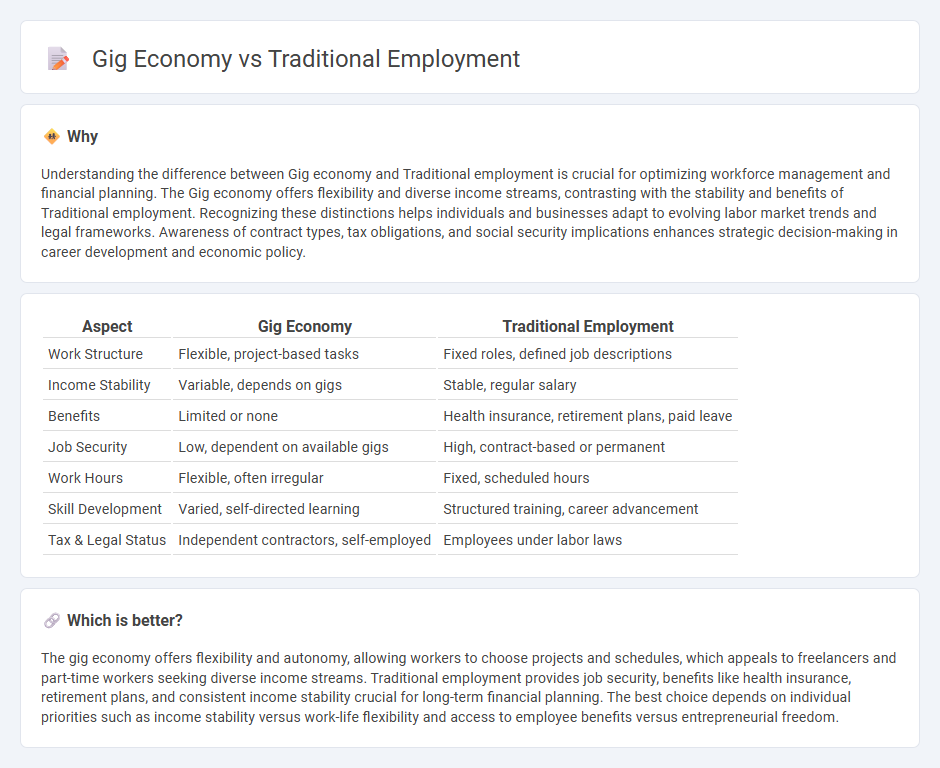
The gig economy offers flexible, short-term contracts or freelance work that contrasts sharply with traditional employment's long-term, salaried positions. Key factors distinguishing gig work include independence, variable income, and lack of standard benefits, while traditional jobs emphasize stability, fixed wages, and employee protections. Explore the evolving economic impact and future trends of gig versus traditional employment models.
Why it is important
Understanding the difference between Gig economy and Traditional employment is crucial for optimizing workforce management and financial planning. The Gig economy offers flexibility and diverse income streams, contrasting with the stability and benefits of Traditional employment. Recognizing these distinctions helps individuals and businesses adapt to evolving labor market trends and legal frameworks. Awareness of contract types, tax obligations, and social security implications enhances strategic decision-making in career development and economic policy.
Comparison Table
| Aspect | Gig Economy | Traditional Employment |
|---|---|---|
| Work Structure | Flexible, project-based tasks | Fixed roles, defined job descriptions |
| Income Stability | Variable, depends on gigs | Stable, regular salary |
| Benefits | Limited or none | Health insurance, retirement plans, paid leave |
| Job Security | Low, dependent on available gigs | High, contract-based or permanent |
| Work Hours | Flexible, often irregular | Fixed, scheduled hours |
| Skill Development | Varied, self-directed learning | Structured training, career advancement |
| Tax & Legal Status | Independent contractors, self-employed | Employees under labor laws |
Which is better?
The gig economy offers flexibility and autonomy, allowing workers to choose projects and schedules, which appeals to freelancers and part-time workers seeking diverse income streams. Traditional employment provides job security, benefits like health insurance, retirement plans, and consistent income stability crucial for long-term financial planning. The best choice depends on individual priorities such as income stability versus work-life flexibility and access to employee benefits versus entrepreneurial freedom.
Connection
The gig economy and traditional employment intersect through hybrid work models where companies blend freelance and full-time roles to enhance flexibility and efficiency. Digital platforms enable seamless transitions between gig tasks and permanent positions, optimizing workforce utilization and reducing labor costs. This integration drives economic resilience by expanding job opportunities and diversifying income streams across various industries.
Key Terms
Job Security
Traditional employment offers greater job security through stable contracts, regular income, and benefits like health insurance and retirement plans. In contrast, the gig economy provides flexibility but often lacks guaranteed hours, consistent pay, and comprehensive employee protections. Explore the key differences in job security between these two work models to make informed career decisions.
Flexibility
Traditional employment offers structured schedules with fixed working hours, providing stability but limited flexibility for employees. The gig economy provides unparalleled flexibility, allowing workers to choose tasks, set their own hours, and balance work with personal commitments. Explore more about how flexibility impacts job satisfaction in both employment models.
Benefits
Traditional employment typically offers benefits such as health insurance, retirement plans, paid leave, and job security, providing a stable financial and social safety net. Gig economy workers often gain flexibility, the ability to choose projects, and potential for diverse income streams but usually lack comprehensive benefits and legal protections. Explore the detailed comparison to understand which work model aligns best with your lifestyle and goals.
Source and External Links
Freelancer vs Traditional Employment: 4 points to keep in mind - Traditional employment involves working full- or part-time for an organization with fixed pay, benefits like health insurance and paid leave, and clear career advancement opportunities, but it offers limited control over schedule and job security depends on the employer's stability.
Traditional vs. Freelance Employment: Pros and Cons - Traditional employment provides greater financial stability through fixed salaries and mandatory benefits such as health insurance and pensions, along with social interaction and workplace perks that enhance employee wellbeing.
The Pros and Cons of a Traditional Career vs. The Gig Economy - A traditional career typically offers job stability, benefits, structured growth, and company culture, but comes with drawbacks like limited flexibility and slower income growth relative to gig work or freelancing.
 dowidth.com
dowidth.com